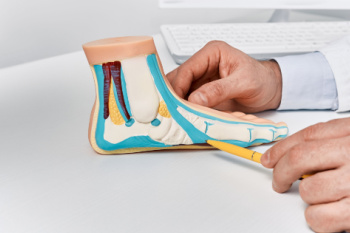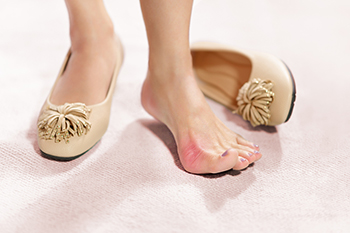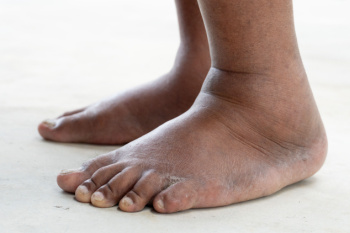Items filtered by date: June 2024
Causes and Symptoms of Flat Feet

Flat feet, or fallen arches, occur when the arches of the feet do not develop properly or collapse over time. This condition can be caused by genetic factors, injury, arthritis, or the natural aging process. Obesity and pregnancy may also contribute to the development of flat feet due to increased pressure on the arches. Common symptoms include foot pain, particularly in the heel or arch area, swelling along the inside of the ankle, and difficulty standing on tiptoe. Flat feet can lead to problems with walking or running and may cause discomfort in the legs and lower back. Proper diagnosis and treatment by a podiatrist can help to manage symptoms and prevent further complications. If you have flat feet, it is suggested that you are under the care of this type of doctor who can help you manage this condition and guide you toward relief solutions.
Flatfoot is a condition many people suffer from. If you have flat feet, contact one of our podiatrists from Pennsylvania. Our doctors will treat your foot and ankle needs.
What Are Flat Feet?
Flatfoot is a condition in which the arch of the foot is depressed and the sole of the foot is almost completely in contact with the ground. About 20-30% of the population generally has flat feet because their arches never formed during growth.
Conditions & Problems:
Having flat feet makes it difficult to run or walk because of the stress placed on the ankles.
Alignment – The general alignment of your legs can be disrupted, because the ankles move inward which can cause major discomfort.
Knees – If you have complications with your knees, flat feet can be a contributor to arthritis in that area.
Symptoms
- Pain around the heel or arch area
- Trouble standing on the tip toe
- Swelling around the inside of the ankle
- Flat look to one or both feet
- Having your shoes feel uneven when worn
Treatment
If you are experiencing pain and stress on the foot you may weaken the posterior tibial tendon, which runs around the inside of the ankle.
If you have any questions please feel free to contact one of our offices located in Plymouth Meeting and Ambler, PA . We offer the newest diagnostic and treatment technologies for all your foot and ankle needs.
Bunions and Their Effects on Women

Bunions, or hallux valgus, disproportionately affect women, significantly impacting their overall foot health. Women are particularly susceptible due to factors like frequent wearing of high-heeled or narrow shoes, along with genetic predispositions. The risk of bunions has been shown to increase with age. The formation of a bunion starts with the big toe bending toward the smaller toes, which leads to a painful bony protrusion on the side of the foot. As bunions progress, they disrupt the alignment and function of adjacent toes. This often leads to formation of hammertoes or claw toes, altered weight distribution, corns and calluses. Research suggests that the severity of bunions correlates with increased pain not only in the feet but also in other parts of the body. Family history and flat feet are other contributing factors to the development of bunions. Addressing bunion deformity through early and effective interventions can offer significant relief and improve overall quality of life. If you are experiencing bunion-related discomfort, it is suggested that you make an appointment with a podiatrist for an exam and treatment.
If you are suffering from bunions, contact one of our podiatrists of Pennsylvania. Our doctors can provide the care you need to keep you pain-free and on your feet.
What Is a Bunion?
A bunion is formed of swollen tissue or an enlargement of boney growth, usually located at the base joint of the toe that connects to the foot. The swelling occurs due to the bones in the big toe shifting inward, which impacts the other toes of the foot. This causes the area around the base of the big toe to become inflamed and painful.
Why Do Bunions Form?
Genetics – Susceptibility to bunions are often hereditary
Stress on the feet – Poorly fitted and uncomfortable footwear that places stress on feet, such as heels, can worsen existing bunions
How Are Bunions Diagnosed?
Doctors often perform two tests – blood tests and x-rays – when trying to diagnose bunions, especially in the early stages of development. Blood tests help determine if the foot pain is being caused by something else, such as arthritis, while x-rays provide a clear picture of your bone structure to your doctor.
How Are Bunions Treated?
- Refrain from wearing heels or similar shoes that cause discomfort
- Select wider shoes that can provide more comfort and reduce pain
- Anti-inflammatory and pain management drugs
- Orthotics or foot inserts
- Surgery
If you have any questions, please feel free to contact one of our offices located in Plymouth Meeting and Ambler, PA . We offer the newest diagnostic and treatment technologies for all your foot care needs.
Foot Swelling Caused by Psoriatic Arthritis
 Psoriatic arthritis can cause swelling in the feet, making daily activities such as walking and wearing shoes very uncomfortable. This condition is a type of inflammatory arthritis that can cause inflammation in the joints and tissues of the feet that results in swelling and stiffness. The swelling may also be accompanied by pain, tenderness, and redness further impacting mobility and quality of life. When individuals with psoriatic arthritis experience flare-ups of symptoms, the swelling and discomfort in the feet can become worse. Managing psoriatic arthritis involves a thorough approach that can include medication, physical therapy, and lifestyle adjustments. Podiatrists, or foot doctors, can offer specialized care for foot-related symptoms of psoriatic arthritis. Some recommendations are supportive footwear, orthotic inserts, and exercises to improve mobility and reduce discomfort. If you have psoriatic arthritis and are experiencing swelling in your feet, it is suggested that you schedule an appointment with a podiatrist for treatment.
Psoriatic arthritis can cause swelling in the feet, making daily activities such as walking and wearing shoes very uncomfortable. This condition is a type of inflammatory arthritis that can cause inflammation in the joints and tissues of the feet that results in swelling and stiffness. The swelling may also be accompanied by pain, tenderness, and redness further impacting mobility and quality of life. When individuals with psoriatic arthritis experience flare-ups of symptoms, the swelling and discomfort in the feet can become worse. Managing psoriatic arthritis involves a thorough approach that can include medication, physical therapy, and lifestyle adjustments. Podiatrists, or foot doctors, can offer specialized care for foot-related symptoms of psoriatic arthritis. Some recommendations are supportive footwear, orthotic inserts, and exercises to improve mobility and reduce discomfort. If you have psoriatic arthritis and are experiencing swelling in your feet, it is suggested that you schedule an appointment with a podiatrist for treatment.
Swollen feet can be a sign of an underlying condition. If you have any concerns, contact one of our podiatrists of Pennsylvania. Our doctors can provide the care you need to keep you pain-free and on your feet.
Swollen feet are a common ailment among pregnant women and people who stand or sit for extended periods. Aging may increase the possibility of swollen feet and patients who are obese often notice when their feet are swelling too. There may be medical reasons why swollen feet occur:
- Phlebitis - A condition that causes the veins to become inflamed and can also cause leg pain.
- Liver disease - This may lead to low blood levels of albumin which is a protein. This can cause fluid in the blood to pass into the tissues and several areas of the body can become swollen.
- Heart failure - When the heart doesn’t pump properly the blood that is normally pumped back to the heart can pool in the veins of the legs causing swollen feet.
- Kidney disease - One of the main functions of the kidneys is releasing excess fluid in the body. This type of condition can make it difficult for the kidneys to function properly, and as a result the feet may become swollen.
- Deep-vein thrombosis (DVT)- This is a serious condition where blood clots form in the veins of the legs. They can block the return of blood from the legs to the heart which may cause the feet to swell. It is important to be treated by a podiatrist if this condition is present.
Swollen feet can also be caused by bone and tendon conditions, including fractures, arthritis, and tendinitis. Additionally, there may be skin and toenail conditions and an infection may cause the feet to swell. Patients who take medicine to treat high blood pressure may be prone to getting swollen feet.
Many patients elevate their feet to help relieve the swelling and this is generally a temporary remedy. When a podiatrist is consulted the reason behind the swelling can be uncovered and subsequently treated.
If you have any questions please feel free to contact one of our offices located in Plymouth Meeting and Ambler, PA . We offer the newest diagnostic tools and technology to treat your foot and ankle needs.
Are You Suffering From Ingrown Toenails?
Strategies for Preventing Falls in the Workplace

In any workplace, the safety and well-being of employees are paramount, and preventing falls is a key aspect of maintaining a secure environment. Employers can implement various strategies to mitigate the risk of falls and minimize potential injuries. One effective method is to maintain a clean and organized workspace, free from clutter or obstacles that could cause tripping hazards. Ensuring proper lighting throughout the premises enhances visibility and reduces the likelihood of missteps. Additionally, installing handrails, guardrails, or non-slip surfaces in areas prone to falls, such as staircases or slippery floors, provides essential support and stability. Regular maintenance of equipment and infrastructure also plays a vital role in preventing accidents. Additionally, comprehensive employee training programs on fall prevention techniques and safety protocols empower workers to identify risks and take proactive measures. If you have a foot injury as a result of falling during your workday, it is suggested that you consult a podiatrist who can offer effective treatment options.
Preventing falls among the elderly is very important. If you are older and have fallen or fear that you are prone to falling, consult with one of our podiatrists from Pennsylvania. Our doctors will assess your condition and provide you with quality advice and care.
Every 11 seconds, an elderly American is being treated in an emergency room for a fall related injury. Falls are the leading cause of head and hip injuries for those 65 and older. Due to decreases in strength, balance, senses, and lack of awareness, elderly persons are very susceptible to falling. Thankfully, there are a number of things older persons can do to prevent falls.
How to Prevent Falls
Some effective methods that older persons can do to prevent falls include:
- Enrolling in strength and balance exercise program to increase balance and strength
- Periodically having your sight and hearing checked
- Discuss any medications you have with a doctor to see if it increases the risk of falling
- Clearing the house of falling hazards and installing devices like grab bars and railings
- Utilizing a walker or cane
- Wearing shoes that provide good support and cushioning
- Talking to family members about falling and increasing awareness
Falling can be a traumatic and embarrassing experience for elderly persons; this can make them less willing to leave the house, and less willing to talk to someone about their fears of falling. Doing such things, however, will increase the likelihood of tripping or losing one’s balance. Knowing the causes of falling and how to prevent them is the best way to mitigate the risk of serious injury.
If you have any questions, please feel free to contact one of our offices located in Plymouth Meeting and Ambler, PA . We offer the newest diagnostic and treatment technologies for all your foot care needs.

